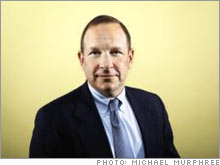|
Healer or dealer? I signed on to be a surgeon, but modern medicine increasingly forces me to think and act like a businessman.
Bronxville, N.Y. (FORTUNE Small Business Magazine) -- "For services rendered" was the billing information my father gave Medicare when he did a hip replacement in the 1970s. He sent in what he considered a reasonable bill, and most of the time Medicare sent him a check. Those checks put me through college and medical school. My father was and still is every inch a doctor - an orthopedic surgeon, as I am - and laughs at the thought of himself as a businessman. He lost money in the market, in cattle and oil tax dodges, on boats and vacation homes; he lost money on many of his patients who never paid for their care. He made enough on the others to make up for it. I'm 48, among the last to have known that easy-billing heyday. But I'm not laughing.
The financially carefree days when we could devote ourselves to medicine and nothing else came to an end about ten years ago. First our accountants told us we were making a little less than the year before, then a lot less. As HMOs became the norm, private-paying patients left our practices. The last of us to face the music finally admitted it: We could no longer practice "pure" medicine as our fathers had. I had to accept that having a private medical practice meant running a business. The most obvious business fix was to simply work more hours and see more patients. That meant no more Wednesday golf, less networking and socializing with colleagues. My weekly free clinic at a local teaching hospital became monthly. But even working 60 hours a week, as I do now, doesn't eliminate the need to think like a businessman. Hand in hand with increasing patient volume, I, like many of my peers, began specializing in fewer but more profitable procedures. Patients like the idea of a doctor who "only does shoulders," and about 60% of my practice now is arthroscopic shoulder procedures. Improved technology and my professional interest played a major role in this, but it was a business decision as well - those patients go home a few hours after their surgery, freeing me from the huge unpaid commitment of time and energy I would have to spend taking care of hospital inpatients. Dropping insurance plans was the next thing to consider, and it was a gut wrencher. I take care of three generations of many families. It's horrible to tell some of these folks - my patients for years - that they have no coverage for my care. I have stayed on with some of these plans. The worst actually pay me less for surgical procedures than my plumber charges me to fix a toilet. For eight years, I've used a computerized billing system that lets me see what HMO participation costs, to the penny. For the same amount of money, would I rather operate on ten cheap-HMO patients or one private-pay patient? I continue to treat quite a few poor patients for free. My wife, who helps manage my office practice, can be quite unenthusiastic about the freebies. They are every bit as demanding as paying patients, calling me at home at night and on weekends, and they can still sue for malpractice. There really is no formula for being both a great doctor and a great businessman. I simply try to be conscious with each decision I make of what I am doing for my own benefit and what I am doing for my patient's. I still meet young doctors-in-training who give themselves completely and responsibly to patient care, and that gives me hope that great medicine will survive until the day when my hip needs to be replaced. Do you think doctors also need to be great businesspeople? Can good medicine and making money mix? Do patients benefit or suffer? E-mail us here and tell us what you think. How does a high-priced 'executive physical' compare to your average HMO doc? To write a note to the editor about this article, click here. |
|

